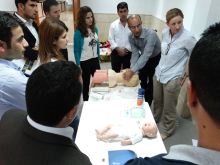 28 May, Amman, Jordan — The increasing scale and magnitude of man-made emergencies in the Eastern Mediterranean Region have highlighted the need for enhanced guidance and capacity-building of health professionals on preparing for, and responding to, events with public health consequences. This includes providing guidance on exposure to chemical agents that can result in a catastrophic impact on affected populations.
28 May, Amman, Jordan — The increasing scale and magnitude of man-made emergencies in the Eastern Mediterranean Region have highlighted the need for enhanced guidance and capacity-building of health professionals on preparing for, and responding to, events with public health consequences. This includes providing guidance on exposure to chemical agents that can result in a catastrophic impact on affected populations.
Since 2013, WHO’s Regional Centre for Environmental Health Action (CEHA) and UK-Med have conducted a number of capacity-building courses for stakeholders throughout the Region on the management of chemical incidents, including hospital management of patients.
Over the past 18 months, the course has been delivered twice in Jordan, for local and international health personnel from the Syrian Arab Republic, Jordan, Lebanon, Iraq and Egypt. A third course took place in Dohuk, Iraq, for more than 65 clinicians and paramedics from the Ministry of Health and included a practical simulation of a chemical hazards event. In total, more than 100 clinicians and decision-makers within the ministries of health of Iraq, Jordan and Lebanon were trained on chemical exposure and trauma care by UK-Med and WHO/CEHA.
Based on a request by the Ministry of Health of Iraq, the most recent training module was modified to accommodate a more practical approach towards mass casualty management and trauma care. A number of important topics were discussed during the training, including overall coordination between stakeholders, self-protection and decontamination, as well as a general overview of various chemical agents and their effect on public health. In addition of presenting an opportunity for the course participants to be exposed to more in-depth information on the subject and the best practices, the training also aimed to draft a framework for the Ministry to deal with such incidents.
Follow up on management procedures of patients inside Dohuk hospital. This latest round of the training was conducted by experts from the United Kingdom’s International Emergency Trauma Register (UKIETR), faciliatated by CEHA and WHO’s Representative Office in Iraq. It aimed to deliver interactive, simulation-based training and education focusing on: the recognition of chemical, biological, and radiological agent toxdromes; the stepwise approach to trauma care in contaminated patients; health worker protection; and the challenges of triage in the contaminated patient.
The training was attended by more than 50 participants from different sectors during the first two days, increasing to 130 participants during the drill on the third day, with participation from health personnel in ambulance services, fire brigade and police forces.
The evaluation of the course in its third round showed that the participants valued the practical nature of the course. During the last day of the drill, many participants noted that this was the first time that the three agencies (ambulance services, police and fire-brigade) had come together in a simulation exercise. WHO is now planning to implement additional rounds of the course in different countries.
Related links
Course on chemical exposure and trauma care, 28–30 July 2014
Regional course on chemical exposure and trauma care, 11–13 November 2013







